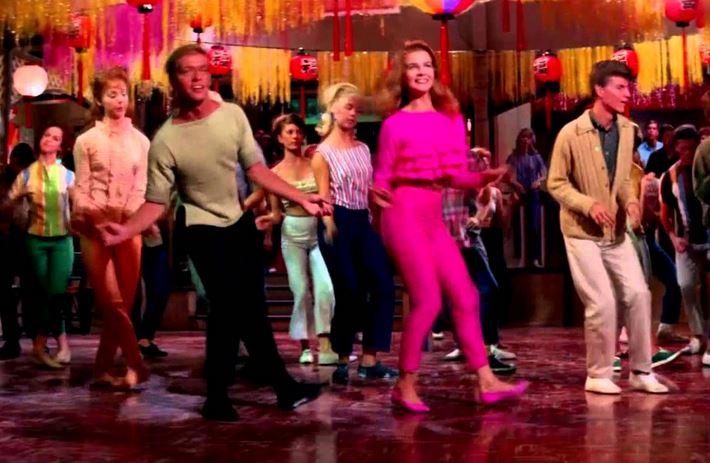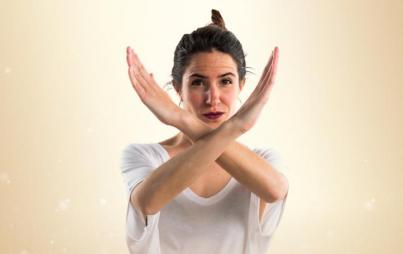
Excited for Into the Woods? Me too. I’m a former theater kid who went through a brief Sondheim phase at the end of high school. Into the Woods is perhaps Sondheim at his Sondheimiest, and It’s also a rare musical that is still in good standing with audiences today.
You know what hasn’t held up so well? Most musicals. Modern ones are more socially conscious, but the vast majority of musicals produced during the Golden Age of Broadway are, well, pretty damn sexist. While I'm well aware that racism, sexism, classism and a whole lot of other ugly-isms are going to crop up in media of a certain age, and I can appreciate that we've come so far since then, it kinda hurts to accept that many of these musicals were so influential on me as a Broadway-obsessed kid. For an art that is so largely skewed toward females—always has been—the stories are almost always solely focused on a man chasing a woman, and the woman falling in love. The plots are often one-sided; they pigeonhole, they slut-shame, they all live happily ever after.
So how do some of America’s best-loved musicals hold up? Let’s take a look—featuring rankings from 1 (a sexist, misogynistic atrocity) to 10 (a proto-feminist victory).
Oklahoma!, 1943
If a reverse Bechdel test existed, Oklahoma! would tank it. Are there any male lead characters? Yes, plenty. Do they talk about anything besides a woman? Uh . . .no, not really. I'm fully aware of the gravity of what I am about to say, but Oklahoma! Is terrifyingly old-school in its views on women.
Based on the title and the fussy costumes, you might think Oklahoma! is a wholesome comedy of errors about country rubes in the Oklahoma Territory. You’d be wrong. It’s actually about two dudes fighting over a woman. That’s it. THAT’S THE WHOLE PLOT. Even hunky Hugh Jackman can’t save it.
Oklahoma!, in actuality, is about Curly and Jud, two men in love with the sweet, unassuming girl-next-door, Laurey. They both go about trying to woo her in various ways, and she must (must!) choose between the two men. Of particular concern is the American standard “People Will Say We’re In Love”: Though she’s starting to fall for Curly, she has second thoughts and tries to put him off. How does he respond? With some old-timey slut-shaming. True, they’re verbally sparring like in an old Shakespearean comedy, but there’s something about Curly’s responses that says, “Whoa whoa whoa. I can’t be held responsible for what I do when you touch my arm.” The problem with Oklahoma! isn't so much the men being braggarts as it is the women being almost totally voiceless.
The only interesting female character is Ado Annie, a girl who makes out with every man she comes across and discovers she kinda likes doing it.
God bless her, even if she eventually agrees to give up her wanton ways.
While it was all well and good at the time, I stand by my statement that Oklahoma! has worn out its relevance outside of pure camp value. The music is a lot of fun on the accordion, though.
OVERALL SCORE: 2
Flower Drum Song, 1958
This doesn’t get performed much these days, as its depictions of Chinese-American life haven’t held up too well. Flower Drum Song is the story of a Chinese-American family in San Francisco, trying to both fit into Western society and hold onto tradition—it's all well-worn territory for musicals of the era. The lowest point for ladies comes in the form of “I Enjoy Being A Girl,” which you’ll hear in commercials and on drag stages every now and then. Among the reasons it’s great to be a female: getting your hurrr did, doing your makeup, and strange men whistling at you! Fun!
Also, that room is waaay too big for a San Francisco home.
OVERALL SCORE: 2
Jesus Christ Superstar, 1973
Jesus Christ Superstar is a total sausagefest, but it’s worth examining its lone female lead, Mary Magdalene. Mary spends the entire show pining for Jesus, a statement I never thought I’d write. This culminates in the famous power ballad, “I Don’t Know How to Love Him."
If you need to know how to love him, he’s probably not that into you. Give up, Mary. Move on.
OVERALL SCORE: 3
South Pacific, 1949
South Pacific, the story of sailors fighting in the South Pacific during World War II, kind of cancels itself out. Its most offensive moment comes early on with "There Is Nothing Like a Dame," a song that sings the praises of objectification.
Sure, if I were stuck on a muggy island with a bunch of other stanky-ass dudes I'd be looking forward to even a whiff of a woman, but this song glorifies the kind of behavior that in the 21st century is almost guaranteed to get a drink thrown in your face.
BUT, this is also the show that brings us the eternal girl-power anthem, "I'm Gonna Wash That Man Right Outta My Hair." You go, Nellie Forbush. You wash him out and you wash him out FOR GOOD.
BUT, the reason she is "washing him out" is because she just found out her lover has interracial children. Not only is she jealous, she's real freaked out that their mom was brown.
BUT, it sorta makes up for it with some progressive political views: This is also the show that brings us "You've Got to be Carefully Taught," a stirring indictment of racism sung by a soldier in love with a South Asian woman.
BUT, said woman is mostly mute for the entire show and honestly, the whole thing reeks of fetishization. Patronizing, but about the best we could hope for at the time.
And Nellie eventually realizes she’s being a jerk about the whole "your kids aren’t white" thing. So I don't know.
OVERALL SCORE: 4
The Sound of Music, 1959
The Sound of Music has gained a reputation as a bland, boring, safe family musical—almost a farce of musicals themselves, which kind of implies a simpering, spineless woman. However, if you look a little closer, there are some redeeming qualities.
You probably already know the plot, but let's recap: The Sound of Music is the (loose) interpretation of the true story of the von Trapp family, a clan of singers that were famous back when people liked to make things like singing families famous. The matriarch of the family, Maria, comes to Georg von Trapp's door to help nanny his children. Though in her autobiography, the real Maria confessed she didn't truly love him (she claims to have married him because she wanted to care for his children), she of course falls under the spell of the burly captain in the musical version. It's fine to fall in love, but, I don't know, it seems kind of secondary and wholly unecessary to the whole kickass-nanny thing.
Then there's his 16-year-old daughter, Liesl. Liesl's a little feisty at first—not a total hellion, but it’s nice to see a young girl testing her boundaries. Then she meets Rolf and you can forget any hope you had about her being a strong female lead.
Really the most powerful women in this show are the nuns, who are the ones that whisper in Maria's ear the whole time. And also, like, defeat some Nazis.
OVERALL SCORE: 4
West Side Story, 1960
I will preface this by saying that West Side Story is, hands-down, my all-time forever favorite musical based on the score alone, so I may exhibit a little bit of bias here. I have a hard time not having a visceral, emotional response to the apex of the Quintet (the buildup begins around 2:47):
West Side Story is the story of gang warfare in the working-class neighborhoods of Manhattan, where people of all backgrounds were forced to mix—gritty stuff for the stage at the time. But, aside from sassy Anita, the girls just don’t factor much into the plot. The most vivid female character we have is Anybody's, a scrappy tomboy who spouts a few humorous lines here and there but gathers only about five minutes of stage time. Though the women aren’t very well-defined, neither are the men: They’re just fighting machines who are continually seeking a score to settle. The real stars of the show are the composition and the choreography; the characters are simply a vessel for them. West Side Story is pretty neutral.
OVERALL SCORE: 5.5
My Fair Lady, 1956
This one alllllmost makes it, but falls apart at the very last second. The play upon which My Fair Lady is based, Pygmalion, is decidedly feminist. Just listen to playwright George Bernard Shaw’s defense of it:
"When Eliza emancipates herself . . . she must not relapse. She must retain her pride and triumph to the end. When Higgins takes your arm on 'consort battleship' you must instantly throw him off with implacable pride; and this is the note until the final 'Buy them yourself.' He will go out on the balcony to watch your departure; come back triumphantly into the room; exclaim 'Galatea!' (meaning that the statue has come to life at last); and—curtain. Thus he gets the last word; and you get it too.”
But that all goes straight to hell with the musical. Professor Henry Higgins, a scholar of linguistics, bets his snobby pals that he can just pluck a woman off the street and turn her from a slovenly street person into a refined lady. He finds his subject in Eliza Doolittle, a Covent Garden flower girl. First step? Embarrassing her for not being able to read the phonetic alphabet (duh, can't you?).
He succeeds in passing her off as a woman of means and life’s good for a while, until she wises up to the fact that he's totally using her to further his social standing in scholarly circles, and is also just an insufferable snob. But instead of defiantly marching out on the man who "saved" her from her lowly past, she forgives him at the very end. At which time he immediately asks her to go get my slippers, woman.
OVERALL RATING: 6
The Music Man, 1957
Here, we a see a woman working at a time when that was still a pretty big no-no. Marion Paroo’s tiny Iowa town is very concerned that she is a woman with a job instead of a husband, but she does her best not to let the haters get her down. Maybe she’ll get married one day, maybe she won’t—it’s not really a priority for her. Then scam artist Harold Hill comes to town and hones in on her, and immediately sets about trying to woo her in the only way he knows how: by pushing her buttons, misdirecting her concerns, and flat-out lying to her.
She of course eventually falls for him, which is . . . yawn. True, he falls for her, too—he slowly realizes how fun it is to talk to someone who can sass him back. However, it’s hard to get over what an annoying, persistent, borderline-pickup-artist of a jerk he was in the beginning.
OVERALL RATING: 6.5
Fiddler on the Roof, 1964
Fiddler on the Roof takes place in 1905, in the Russian village of Anatevka, just before the pogroms came for the Jewish population. In the second number of the show, the daughters of Tevye, a poor milkman, are singing about finding themselves a man—not a bad thing at all—when all of a sudden the oldest sis comes in and reminds them all that the best they can hope for is a fat, old drunk that beats them on the daily.
The girls are a little too stoked about the prospect of getting married off, and having little to no say in the matter at all. But really, that’s about all women in that time in place had to look forward to. The creepy irony of the girls gaily singing about being physically abused is a very effective reminder of the shit women have kept their mouth shut about for most of history. You also have to hand it to their mother, Golde, who is refreshingly feisty but also harbors concern that she might have been a victim of the same oppressive traditions her daughters are facing.
OVERALL SCORE: 7
On the Town, 1944
On The Town, though it’s the oldest show on here, actually scores pretty high. It starts off shaky: Three sailors arrive in New York to see the sights, but are quickly distracted by a beautiful woman on a billboard. One of them, Gabey, makes it his mission to find her and the other two agree to help. Along the way they meet Hildy, a taxi driver—hark, a woman with a job!—who desperately tries multiple times to get sailor Chip to come up to her place and, uh, let her show him the sights.
Next, they happen upon Claire, an anthropologist who, in the film version, tells them exactly what she wants in a man.
Granted, there are some hiccups here and there—Hildy’s behavior is certifiably psychotic, both womens' determination is treated as an anomaly, and that hair-dragging scene in the above video doesn't sit too well with me. Even still, props to the ladies of OTT for knowing what they want and going for it. Women in musicals rarely do that even today.
And yes, there are some cringe-worthy racist moments in the film, but that’s another list for another post.
OVERALL RATING: 7.5
Bye Bye Birdie, 1960
Kim MacAfee don’t need no man! She’s got such a lot of livin’ to do.
Bye Bye Birdie is the screwball story of the wacky denizens of Sweet Apple, Ohio. When pop star Conrad Birdie comes to town for a publicity stunt, everyone loses their shit. 15-year-old Kim MacAfee has been selected via a contest to kiss Conrad on The Ed Sullivan Show the night before he goes off to war. This causes her to feel all the feels.
Her dorky boyfriend, Hugo, is having none of it, but Kim wastes no time telling him what a jealous jerk he’s being. Bye Bye Birdie is a winner in that it, instead of waiting for the woman to fall in love with the man, places the power in Kim’s hands. And that’s just it—all the women in this show are horny, hormonal man-eaters. Rosie Alvarez, sensing infidelity in her sweetheart Albert, exacts revenge by trying to seduce a bunch of Shriners. Even Albert’s mama, after openly hitting on the much-younger Conrad, gets herself eloped.
We know now that women bossing men around, as Kim expresses a desire to do (Exact words: "How lovely to be a woman/to have one job to do/To pick out a boy and train him/and then when you are through/You’ve made him a man you want him to be . . . ”) does not equal feminism, but Bye Bye Birdie portended the burgeoning sexual revolution on the Broadway stage by empowering its women with personalities and opinions and non-Caucasian backgrounds. Good stuff.
OVERALL SCORE: 8
Cabaret, 1966
West Side Story is Sesame Street compared to Cabaret. Don't believe me? Here is the off-kilter, ever-so-slightly-offputting opening number from the film version:
In it, Sally Bowles is a 19-year-old ex-pat making a living as a singer at a seedy Berlin nightclub. It’s kind of implied throughout the story that Sally’s got something in her past she's trying to forget—she exaggerates, she’s wishy-washy, she’s way too optimistic for her own good—and she’s hiding from an unhappy upbringing in Berlin’s underworld. She seeks fame, fortune, and the good life, and finds solace in being someone else onstage.
Did I mention this is 1931? All the while, the Third Reich is slowly creeping into Berlin and carefully dismantling Sally’s world. When she’s begged to come to America for her own safety, she, out of sheer denial, refuses to leave behind Berlin and her booze-soaked nightlife. Tragic story, but Sally’s a landmark in that she’s one of the first fully-fleshed-out female characters on the Broadway stage.
The show also has a downright gleeful attitude toward alternative lifestyles and non-monogamous sex, so there's that.
OVERALL SCORE: 9.5






